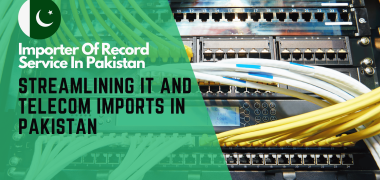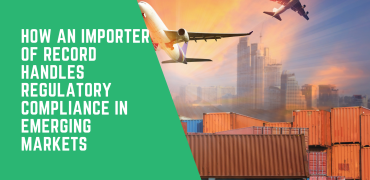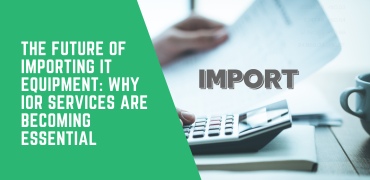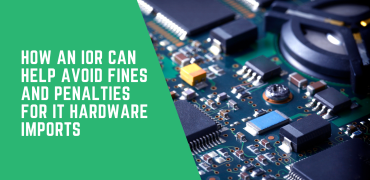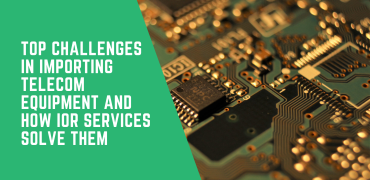Importing IT and Telecom equipment into Pakistan involves navigating a series of regulatory frameworks set by various governmental bodies. This sector is particularly sensitive due to security concerns and the strategic importance of the technology and telecommunications industry. Here are some of the key regulations and requirements you need to be aware of when importing these types of equipment into Pakistan:
Regulatory Approval from PTA
The Pakistan Telecommunication Authority (PTA) is the primary regulatory body overseeing the importation of telecom equipment in Pakistan. Any IT and Telecom equipment that uses radio frequency or connects to public telecom networks must obtain Type Approval from PTA. This includes items such as mobile phones, wireless routers, and satellite communication devices. The Type Approval process ensures that equipment complies with specific technical standards of operation and does not interfere with other equipment or services.
Import Licensing and NOCs
Certain types of equipment may require a No Objection Certificate (NOC) or a specific import license. This is especially true for equipment that has dual-use capabilities (i.e., can be used for both civilian and military purposes). Importers need to check with the Ministry of Information Technology and Telecommunication (MoITT) and other relevant authorities to determine if their equipment falls under these categories.
Customs Duties and Taxes
Import duties and taxes vary depending on the type and value of the equipment imported. Pakistan’s Federal Board of Revenue (FBR) regularly updates these tariffs. Importers must ensure that they are compliant with the latest tax rates and customs regulations. Valuation of IT and Telecom equipment must be accurately declared to avoid penalties or delays in customs.
Documentation and Compliance
Comprehensive documentation is crucial for the smooth importation of IT and Telecom equipment. Typical documents required include:
- Commercial Invoice
- Packing List
- Bill of Lading or Air Waybill
- Certificate of Origin
- PTA Type Approval Certificate
- NOC, if applicable
- Import License, if required
These documents must be correctly filled out and presented to customs authorities. Misdeclaration can lead to significant fines and confiscation of goods.
Standards and Quality Control
The Pakistan Standards and Quality Control Authority (PSQCA) sets mandatory standards for many products, including some categories of electronic equipment. While not all IT and Telecom equipment fall under PSQCA’s mandatory list, ensuring compliance with applicable standards is vital for market acceptance and consumer safety.
Import Restrictions
Pakistan has restrictions on the import of used and refurbished IT and Telecom equipment. The government implements these restrictions to avoid the dumping of obsolete technology and encourage the use of modern and efficient technology solutions. Importers should verify the latest regulations regarding used equipment before arranging their shipments.
General Duty Structure for IT and Telecom Equipment in Pakistan
• Customs Duty: The customs duty on IT and telecom equipment in Pakistan varies. Some essential IT items such as laptops, desktops, and servers may benefit from lower customs duties or even exemptions designed to promote information technology in the country. However, telecom equipment, especially if it involves radio or transmission devices, generally incurs higher duties.
• Sales Tax: Import of IT and Telecom equipment is typically subject to a standard sales tax rate of 17%. This rate applies unless a specific exemption or reduction applies under certain conditions stipulated by the government.
• Additional Sales Tax: For items that fall under regulatory duty, an additional sales tax may apply, which could range from 2% to 3%.
• Regulatory Duty: Some items of telecom equipment may also be subject to a regulatory duty, depending on their classification under the Pakistan Customs Tariff (PCT) codes. This duty can significantly increase the overall tax burden on specific types of equipment.
• Income Tax (Withholding Tax): Importers are also required to pay an adjustable advance income tax at the time of import. This rate typically varies between 5.5% to 6% for registered taxpayers and can be higher for non-registered entities.
• Federal Excise Duty (FED): This is generally not applicable to IT and telecom equipment imports unless specified in the federal government’s fiscal policy.
How ASL IOR Service Can Help IT & Telecom Companies with Hassle-free import process
ASL IOR (Importer of Record) Service in Pakistan provides specialized assistance to IT and Telecom companies looking to import equipment into the country. This service is invaluable for companies that do not have a local presence in Pakistan or those that seek expertise in navigating the complex customs and regulatory requirements.
For IT and Telecom companies, partnering with ASL IOR Service in Pakistan can simplify the process of importing technological equipment, ensuring compliance, and enhancing efficiency. This service not only helps in tackling the bureaucratic and logistical challenges but also supports companies in their strategic business expansion within Pakistan’s growing market.
